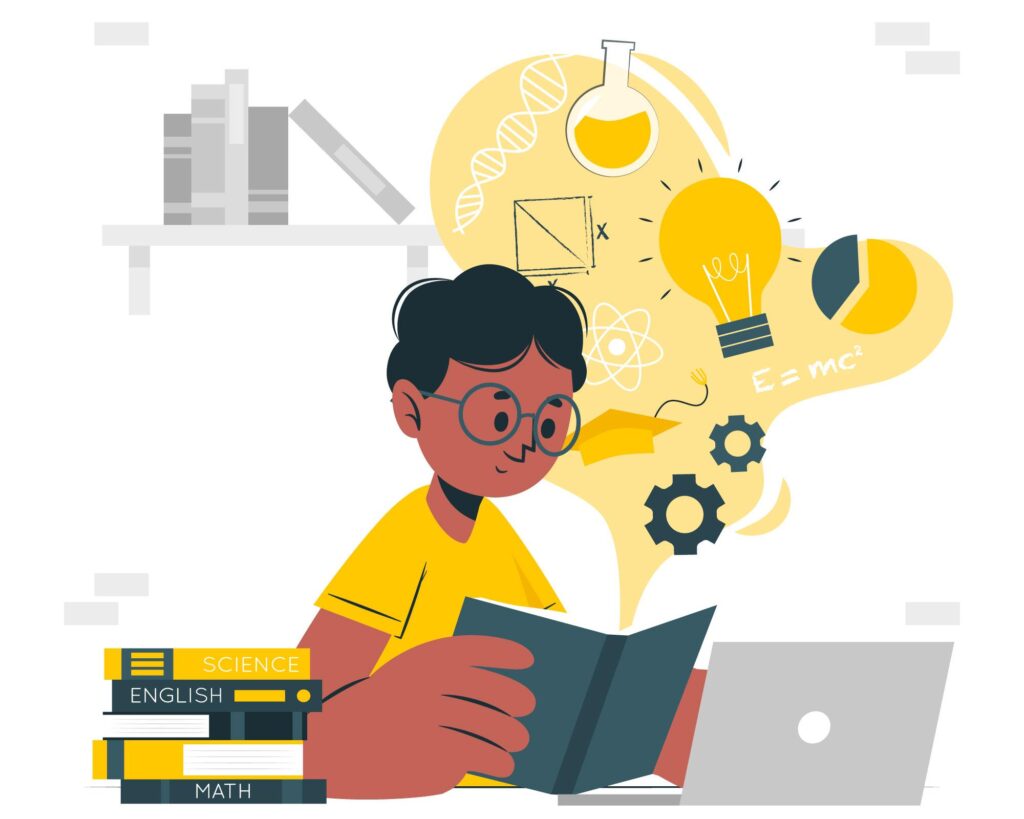Whether it’s a new technology, a foreign language, or an advanced ability, staying competitive frequently entails learning new things. According to Pew Research Center research published in March 2016, over two-thirds of workers in the United States have taken a course or sought more training to advance their employment.
They claim that the outcomes included a larger professional network, a new job, or a different career path. Being a quick learner can offer you an even bigger advantage. Science has proven six techniques on how to study fast
How to Study Fast in Less Time

Anyone may increase their efficiency and study skills. They only need to learn certain techniques and hacks to do so.
Let us go deeper into the topic and explore how students can learn more effectively.
1. Create a Schedule
The number one secret to good studying is to plan out everything that needs to be done and learned, and then schedule it accordingly. Spend some time learning more about time management techniques. It will drastically transform your approach to studying.
2. Allow your brain to choose the best time
To make the most of your studying time, you must first identify the period when your mind is ready to interact and function at its best. Most people can think, memorize, and produce their best ideas after a good night’s sleep. Your body feels relaxed and ready to work at its full potential.
Hopefully, your best performance time is not at night. Otherwise, you’d have difficulty balancing your daytime and nighttime studies. Remember that you need 6–8 hours of sleep to be healthy!
3. Study in a quiet, comfortable environment
Trying to concentrate at home, where everything is usually noisy and loud, can be a daunting endeavor. In an environment with so many possible distractions, you will struggle to work well. In this instance, we propose that you choose a quieter spot to study.
4. Take Notes in Class and at Home
If you want to learn how to study more quickly, you must take notes. You might object, claiming that taking notes takes too much time.
But does it? You will spend some time taking notes. However, studying at home and preparing for the exam will save you a lot of time. You will have all of the relevant facts and references in one spot.
You will remember the important facts presented in your lessons (which you may not discover in books). You’ll memorize faster if you write it down—writing is significantly better for memory than typing!
You’ll immediately refresh your memory on all of the important information you’ll need for your test. The note-taking strategy proves to be one of the best studying methods for people wondering how to study for an exam quickly and effectively.
5. Take breaks
As unbelievable as it may sound, taking regular pauses during your study will save you time. The idea is to give your brain enough of a break to improve its performance. Do not sit stationary for hours. Instead, get up every 30–60 minutes and remember to stretch your legs and arms.
In this manner, you can avoid stiffness and muscular cramps. You may even choose to engage in more strenuous exercises to boost your metabolism and make you feel more invigorated. Moving your body will also help you focus, remember, and be more creative.
6. Use Mind-Mapping
To make your facts more visually appealing and easier to remember, organize them into maps, clouds, graphs, charts, tables, and other formats. This study strategy is certain to improve your performance and save you time, especially if you’re a visual learner.
You may take this strategy a step further by collaborating with your peers using online mind map applications such as Popplet or Spiderscribe, where you can brainstorm ideas, trade ideas, and share maps.
7. Use Online Tools for Learning
Online tools are not only entertaining, but they may also serve multiple functions and boost your productivity.
Here’s how they can help you:
- Improve your creativity and critical thinking skills.
- Collaborate and share ideas with students, friends, and peers.
- Conduct research using extensive internet content databases.
- Organize and manage your information.
- A learning-type questionnaire will help you determine the best way to study.
- Deepen your understanding by taking free online courses.
How to study fast without forgetting
1. Active Recall
Active recall is an effective method for learning and retaining information. It entails actively attempting to retain knowledge rather than simply reading or listening to it passively.
This can be accomplished using flashcards, quizzes, or practice problems When you actively recall knowledge, you improve the neural pathways in your brain that connect to that information.
This helps you remember the knowledge in the future. Simply put, when you actively strive to recall something, your brain is more likely to retain it in long-term memory.
This is because active recall entails bringing knowledge to the mind without any external signals, which improves the connections between neurons in your brain.
Active recall can also help you identify areas that require additional practice and targeted learning.
This allows you to focus your study efforts more efficiently, potentially leading to improved overall learning outcomes.
Overall, regular usage of active recall can help you enhance your memory and learning capacities, allowing you to retain information for extended periods. So, if you want to study quickly without forgetting and remember more, include active recall in your study regimen!
2. Spaced Repetition
Spaced repetition is a memory method that involves reviewing material at increasing intervals throughout time.
This strategy makes use of the spacing effect, which states that learning is more effective when spread out across time.
Several apps use spaced repetition algorithms to help you study more efficiently. These programs figure out the optimal time to revisit knowledge based on how well you recall it.
Spaced repetition can help you increase your memory retention and recall knowledge over time.
It reinforces learning by exposing students to knowledge at scientifically verified intervals to improve memory retention.
Incorporating spaced repetition into your study practice will help you learn more efficiently and effectively, leading to improved academic success.
3. Chunking
Chunking is a strategy for dividing information into smaller, more manageable parts. This strategy works because it allows you to focus on fewer chunks of information at a time, which makes it simpler to remember.
For example, if you need to memorize a large list of numbers, divide them into smaller groups of two or three to make them easier to remember.
By chunking information, you can strengthen your working memory, which is the ability to keep and modify information in your head. Chunking is an effective study approach because it allows you to acquire and recall vast amounts of material more efficiently.
It is also an effective method for organizing and prioritizing information, allowing you to concentrate on the most crucial facts.
Overall, chunking is an effective learning method because it makes the material more accessible and memorable, which improves academic achievement.
4. Active learning
Active learning is a method of learning in which students actively engage with the material they are studying rather than passively receiving it.
This strategy necessitates active engagement by the student, such as taking notes, asking questions, or discussing the material with classmates.
Actively engaging with the content improves your ability to process and retain knowledge, resulting in greater long-term memory.
Active learning enhances critical thinking and problem-solving skills by encouraging students to think carefully about the content and apply it in real-world circumstances.
This method can be applied in a range of learning venues, including classrooms, online courses, and self-study settings.
Active learning has been demonstrated to be more effective than passive learning approaches, such as reading or listening to lectures, in terms of improving subject retention and comprehension.
By incorporating active learning into your study regimen, you may boost your academic performance, increase your critical thinking abilities, and gain a better comprehension of the content. This will undoubtedly help you achieve your goal of studying quickly without forgetting.
5. Visualization
Visualization is a learning method that involves constructing mental representations or diagrams, to represent the content being studied.
This strategy is very effective for grasping complex or abstract material since it makes it more concrete and memorable.
By making mental representations or diagrams, you engage your visual memory, which might help you remember the information later.
Visualization can also help find links between pieces of information, resulting in a better grasp of the material.
This strategy can be used with a wide range of learning resources, including textbooks, lectures, and other forms of instructional content.
Actively visualizing knowledge creates a more vivid and memorable representation of the topic, which can lead to improved retention and comprehension.
Overall, visualization is a strong technique for learning because it allows you to develop mental models of the knowledge you’re studying, which improves retention and comprehension.
6. Finally, get enough sleep
Getting adequate sleep is critical for effective studying because it promotes memory consolidation, which is necessary for remembering what you’ve studied.
When you sleep, your brain analyzes and consolidates the information you’ve acquired, strengthening neural connections and improving long-term recall.
By aiming for at least 7-8 hours of sleep per night, you give your brain enough time to conduct these critical memory processes, which can contribute to better academic achievement.
Staying up all night cramming for tests is unproductive because it impairs your ability to remember what you’ve learned.
Lack of sleep can also cause weariness, trouble concentrating, and poor decision-making, all of which can have a detrimental impact on your academic performance.
Making sleep a priority in your study regimen will help you acquire and remember more knowledge while also improving your general health and well-being.
Incorporating healthy sleep habits into your routine, such as sticking to a regular sleep schedule and developing a soothing nighttime ritual, will help you obtain the restful sleep you require to achieve academically.
Conclusion
Remember that how you align your learning process might make or break your college or university success. A “smart studying” method will save you a significant amount of time compared to studying “hard.”
The entire studying process boils down to your “focus.” To strengthen your focus and learn things faster, you must select the appropriate study technique. It will allow you to grasp the substance of the subject matter and then immediately apply it to any newly discovered notions.
First, you should do a critical analysis of your existing learning technique to determine what is taking up too much time. Then, use our tried-and-true strategies to boost your performance while reducing the amount of time you spend studying.


